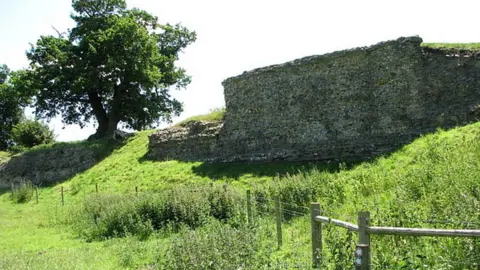More parking planned for Roman ruin site near Norwich
 Evelyn Simak/Geograph
Evelyn Simak/GeographA Roman ruin site could see its car park expanded to cope with a rising number of visitors.
The popularity of the remains at Caistor St Edmund, near Norwich, has prompted concerns the site has outgrown present parking facilities.
Expansion would be funded by the "community infrastructure levy" (CIL), paid by housing developers, the Local Democracy Reporting Service said.
However it is not clear if the plan will actually go ahead, critics said.
The area around Caistor St Edmund was once the capital of the Iceni tribe, a Brittonic tribe during the Iron Age and early Roman era.
The scheme would cost around £90,000 and could be paid for by a CIL - which is a charge on housebuilding for supporting local projects.
The money is allocated by the Greater Norwich Growth Board (GNGB) - a group made up of Norwich, South Norfolk, Broadland and the county councils.
 Culture Club/Getty Images
Culture Club/Getty ImagesThe historic site at Caistor St Edmund saw its best-known leader, Queen Boudica, launch a revolt against the Roman invaders.
The site was also settled by the Romans themselves, who called it Venta Icenorum - or "market place of the Iceni tribe".
Interest in it was triggered in the 1920s, after an RAF reconnaissance aircraft took a series of aerial photographs which showed the outline of streets and buildings, appearing as pale lines in the fields.
It is now considered one of Norfolk's most significant Roman sites.
The Caistor scheme is among dozens of potential CIL projects across the Norwich area outlined in the GNGB infrastructure plan, which the organisation approved at a meeting on Monday.
However, not all the projects necessarily end up being completed.
Grace Burke, a GNGB officer, warned that "60-70% of the projects in the plan are purely aspirational".
John Fuller, the chair of the board and Conservative leader of South Norfolk Council, criticised the plans, describing the list of projects as "nothing more than a shopping list" which needed a better steer on their feasibility.

Find BBC News: East of England on Facebook, Instagram and Twitter. If you have a story suggestion email [email protected]
